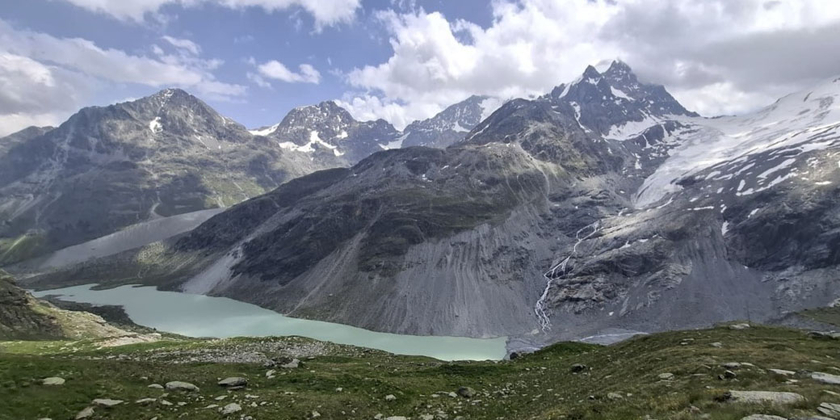Department Water Resources and Drinking Water
Characterization of Cryosphere-Groundwater Interactions in Alpine Spaces

© Angela Welham
2025-08-12 at 16.23.03
Cryosphere–groundwater system characterisation in Alpine regions remains poorly constrained, despite groundwater supplying up to 80% of Switzerland's drinking water. The Upper Engadine, one of Switzerland’s two inner-Alpine dry valleys, is among the areas most strongly affected by climate change. Besides the Engadine Valley’s vulnerability to climate change, it is characterised by a unique hydrogeological setting that includes numerous freshwater snowmelt-fed springs, rapidly melting glaciers, CO2-rich thermal groundwater, arsenic-enriched lakes, and an extensive Quaternary Aquifer uncommon for a high Alpine region. This project will establish a multi-tracer framework and an integrated surface–subsurface hydrogeological model to quantify cryosphere–groundwater interactions and their response to climatic forcing. The work supports the “Wassermanagement Region Maloja 2024+” initiative, a regional effort to improve long-term water management for the Swiss supra-community Region Maloja. Tracer analyses include major ions, trace elements, O and H isotopes, microbial indicators, and online continuous real-time dissolved gas measurements, combined with citizen-science-based hydrological sampling. These datasets will be assimilated into an integrated three-dimensional hydrogeological model to resolve water origins, recharge dynamics, mixing processes, and flow paths, between snowmelt, glacial melt, rainwater, and groundwater in a spatio-temporal context.
Project team
Supervisor:
- Prof. Dr. Oliver Schilling (Eawag, W+T, Head Tracer Hydrogeology Group; University of Basel, DUW, Head Hydrogeology Research Group)
PhD Student:
- Angela Welham (Eawag, W+T, Tracer Hydrogeology; University of Basel, DUW, Hydrogeology)
Co-Supervisors:
- Prof. Rolf Kipfer (Eawag, W+T, Head Environmental Isotopes Group; ETHZ)
- Dr. Stefanie von Fumetti (University of Basel, Spring and River Ecology Group Head)
Technician:
- Reto Britt (Eawag, W+T)
Collaborators:
- Dr Jared van Rooyen (Eawag, W+T, Tracer Hydrogeology; Senior Postdoc)
- Dr. Yama Tomonaga (Eawag, W+T; University of Basel, DUW, Hydrogeology)
- Ms Friederike Currle (University of Basel, DUW, Hydrogeology; PhD student)
- Dr Stephanie Musy (University of Basel, DUW, Hydrogeology; Postdoc)
Partner
Funding
Publications
- Musy, S. L., Dresmann, H., Tawara, Y., Tomonaga, Y., Sano, Y., & Schilling, O. S. (2025). Mt. Fuji’s Watershed Under the Lens: Advancing 3D Hydrogeological Models for Climate Resilience Japan Geoscience Union Meeting 2025, 25-30 May, Makuhari Messe, Chiba, Japan.
- Giroud, Sébastien et al. (2025) 'Resilience of deep aquifer microbial communities to seasonal hydrological fluctuations', Proceedings of the National Academy of Sciences, 122(23). Available at: doi.org/10.1073/pnas.2422608122.
- Van Tiel, Marit et al. (2024) 'Cryosphere–groundwater connectivity is a missing link in the mountain water cycle', Nature Water. 19.07.2024, 2, pp. 624–637. Available at: doi.org/10.1038/s44221-024-00277-8.
- Van Tiel, M. et al. (2024) 'Cryosphere-groundwater connectivity in the mountain water cycle - where does meltwater go?', in EGU General Assembly 2024. Vienna, Austria (EGU General Assembly 2024), pp. EGU24–4092. Available at: doi.org/10.5194/egusphere-egu24-4092.




